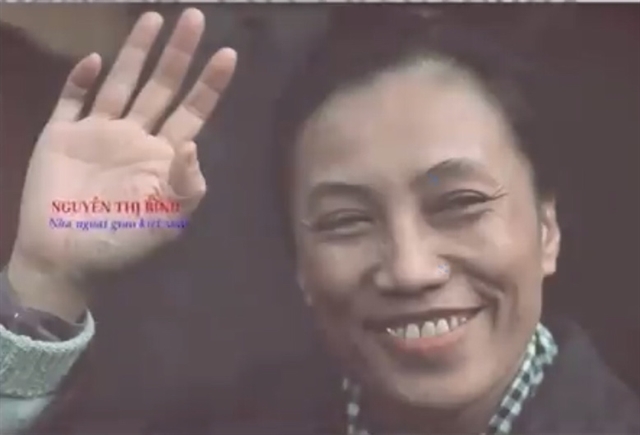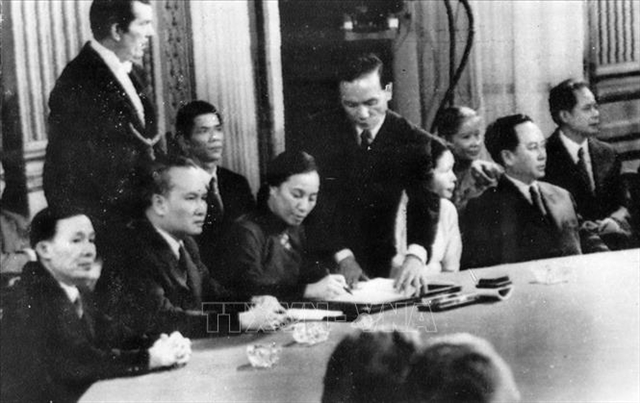Weather:
- Ha Noi 28oC
- Da Nang 29oC
- Ho Chi Minh 29oC

HÀ NỘI — Madam Nguyễn Thị Bình, the only surviving dignitary of the four parties who signed the Paris Peace Accords to restore peace in Việt Nam, is 98 years old today. By Vietnamese traditional way of ageing the nation counts the year in a mother's womb, so she's already 99.
She has had a career that spans 60 years from the 1940 during the Resistance war against the French, through to the height of career when she represented the National Liberation Front of South Việt Nam at the Paris Peace Accords in 1968, through to the time when Việt Nam was united in 1975 and on.
Having retreated from official and diplomatic state events, Madam Bình still chairs The Việt Nam Child Protection Foundation. In 2003, one year after retirement, she founded and chairs the Việt Nam Peace and Development. She is also Honourary Chairwoman of the Việt Nam Agent Orange Victims Association when it was established in 2004. In 2006, she became Chairwoman of the Phan Châu Trinh Culture Foundation, named after her great patriot and grandfather.
Born Nguyễn thị Châu Sa in May 26, 1927 in Tân Hiệp Village, Châu Thành District of Sa Đéc Province in French Indochina today the village is called An Hiệp and is in Đồng Tháp Province. But the family originally came from Quảng Nam Province in Tonkin, the centre of today's Việt Nam.
Her father Nguyễn Đồng Hợi was a public works counselor, doing mapping works during the French rule. Her mother Phan thị Châu Lan was great patriot and daughter of Phan Châu Trinh. Trinh was the first scholar in the country who raised the issue of democracy and civil rights with the popular motto "khai dân trí, chấn dân khí, hậu dân sinh" (open the people's mind, strengthen people's spirit and care for people's lives).
The family lived in Phnom Penh, Cambodia and she studied at Lycee Sisowath, one of the most notable secondary schools in Southeast Asia, hence her beautiful French when she addressed the press during the tense session of the negotiation process of nearly five years in Paris.
When Châu Sa was 17, her mother died and the family moved back to her homeland with her having had to take care of her six younger siblings, four boys and a girl. Her father was passionate about technical study and had a lab with engineering tools to make things at home. In her memoir 'Gia đình, bạn bè và đất nước', (Family, Friends and Country) published in 2012, she wrote: "My father loves working and he sees people in how they work. His attitude was clear: he likes hard-working people, and dislikes lazy ones. During my working life, I was close to working people, and would assess them on the work they do, their attitude to work and fellow workers. Thinking back, I feel very grateful to my father for that."
The August revolution succeeded in August 1945 and President Hồ Chí Minh declared Việt Nam a democratic republic on September 2. But the French re-occupied Nam Bộ, known as Cochinchina under French Rule, her father withdrew to the resistance base following the call of the Nam Bộ Resistance Administration Committee. Châu Sa stayed in the city to take care of her younger siblings, as well as working for the Việt Minh underground activities in the students, schoolchildren and women groups with a nickname, Yến Sa.
In 1948, she joined the Indochina Communist Party. In 1951, she was arrested by the French, jailed and questioned at Catinat Station, then moved to Khám Lớn Sài Gòn then notorious Chí Hoa Prison until 1953.
When the Việt Minh won at Điện Biên Phủ in May 1954, she was released from prison and joined a peaceful movement to carry out the Geneva Peace Agreement. In 1955, she moved to Hà Nội. In December 1954, she reunited with her highschool sweetheart, Đinh Khang. They got married after nine-year long wait. Their son Đinh Nam Thắng was born in 1956 and daugher Đinh Thùy Mai born in 1960.

In December 1960, Việt Nam National Liberation Front was established and she moved to work in the Reunification Committee, taking care of people's diplomatic relations of the front and changed her name to Nguyễn Thị Bình, with Bình meaning peace. During the next years, she raised her children and continue working trips to mobilise international support for the NLF at many forums to raise awareness and call on governments and people of the world to support the NLF fight for Peace.
She represented NLF in meetings with people in Hungary, the Soviet member countries, a couple of times in Indonesia, in Tanzania, Africa and then Tchekhoslovakia, today's Slovakia Republic.
In November 1968, she and the NLF delegation arrived in Paris to get ready for the long arduous negotiation, that was going to last for five years for peace and the independence of Việt Nam.
Then she continued her journey to more countries to call for their government and people's support with the delicate negotiations still going on in Paris to which she would return for.
Oficial negotiation between four parties at Paris Peace Agreement started in January 1969 with Lê Đức Thọ representing Democratic Republic of Việt Nam, Henry Kissinger representing the United States, Nguyễn thị Bình representing the NLF of South Việt Nam and Trần Văn Lắm representing the Republic of South Việt Nam.
Madam Bình spoke at Trafalgar square in London, addressing peace activists to support the NLF and end the war in Việt Nam.
A month later, in May, her father died in Việt Nam. Also in May, the NLF announced its ten-point stance at Kleber Press Centre in Paris.
Then the Provisional Government of Republic of South Việt Nam was established, Nguyễn thị Bình was assigned to be Foreign Minister and Head of the negotiation delegation of the Provisional Government at the conference.
"The West was very surprised to see Madam Bình representing the Provisional Government of South Việt Nam," recalled Tôn Nữ thị Ninh, Việt Nam's former Ambassador to Belgium who was her colleague.
In 1970, she visited Sweden at the invitation of Olof Palme, Swidish Prime Minister, who took to the streets to demontrate his support for Việt Nam and was assassinated. She also visited India and Sri Lanka.
Back in Paris, the Provisional Government of Republic of South Việt Nam issued a eight-point declaration requesting the US to withdraw all forces by June 1971 and set up a joint-government in South Việt Nam.
She then visited Zambia, Cuba, and in 1971, the Provisional Government issued a seven-point plan requesting the US total withdrawal and establish a national harmony government.
In 1972, the Provisional Government offered a two point solution requesting US total withdrawal and establishing a joint government of the Provisional Government, the Republic of South Việt Nam and a third factor.
In September 1972, Lê Đức Thọ went to Paris with a 'Draft of Paris Peace on ending war and restoring peace in Việt Nam'.
In December 1972, the US used B52s to drop bombs in Hà Nội and Hải Phòng.
In January, Lê Đức Thọ and Henry Kissinger briefly signed at the Paris Peace Accords, along with Madame Bình and three others.
The US withdrew its forces in January 1973. Two years later, without the backing of the US military, the local forces of the Provisional Government rose up and military forces of Democratic Republic of Việt Nam captured Sài Gòn and liberated the South. Việt Nam became one united country and the first national election was held in 1976.
In a newly united Việt Nam, Madame Bình became Minister of Education, a position she served until 1992. Then she became Vice President until she retired in 2002. VNS


